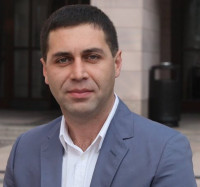Artificial Intelligence & Emerging Technologies
Healthcare Systems
Quantum Computing & Quantum Technologies
Public Health & Health Policy
Machine learning
Gen AI & Deep Learning
AXA Chairs
Turkey
2020.02.03
AXA Chair on Molecular Information and Communication Technologies
The Internet of Nano-Things (IoNT), which defines these networks of nanomachines, such as nano-biosensors and engineered bacteria integrated with the Internet infrastructure, has recently garnered tremendous interest. IoNT is set to transform the way we connect with and understand the world . However, conventional electromagnetic (EM) communication techniques have proven impractical for the nanoscale due to antenna size,power limitations and the large propagation losses when the electromagnetic wave propagates through space.
On the other hand, Nature itself provides a robust means of nano-communication, i.e., Molecular Communications (MC), the common communication modality among living cells, from our own neurons to bacteria. Using a commun language with living cells by encoding, transmitting and receiving information via molecules offers energy efficient and reliable nano-communications, even in harsh biological environments, where the most impactful medical applications of IoNT is expected.
Yet despite the interest in this field and the large body of theoretical work aimed at devising communication methods for MC, no working prototype of an artificial MC has been created to date. Because of the highly complex, nonlinear, and time-varying channel properties of MCs due to the discrete nature of these information carriers, their substantial channel memory, and the peculiarities of molecular interactions at nanoscale, conventional ICT tools do not always work. This unique challenge calls into question the reliability of existing MC methods, which are mostly adopted from conventional EM communications and not validated with practical MC devices. There is an urgent, unmet need for practical MC devices at micro/nanoscale to bridge this gap between theory and practice and unleash the envisioned applications of IoNT and MC.
It is in this context that the AXA Chair program led by Prof. Ozgur B. Akan will develop a programme spanning the fields of molecular communications, nanotechnology, biotechnology, and translational medicine. Implemented in the Department of Electrical and Electronics Engineering (ELEC), and the Koç University Research Center for Translational Medicine (KUTTAM), the program will endeavour to bridge the gap between information and communication technologies (ICT) and several disciplines – including physics, molecular biology, nanotechnology, biotechnology and medicine – to create important collaborative opportunities focused on the most pressing global societal challenges related to Life & Health, Data & Technology, and the Environment.
The proposed research program aims to implement the very first artificial micro/nanoscale MC systems in liquid and air environments by fabricating MC-transceivers (MC-TxRxs) based on novel nanomaterials such as graphene, hydrogels, and xerogels. Given the peculiarities arising from nano-physical and biochemical processes, and the computational and energy-based limitations of nanomachines, the program will revisit conventional ICT tools and devise new ones for MC based on empirical knowledge gained through the fabricated MC system prototypes.
The project will focus on two applications: (i) a distributed molecular nano-sensor network for environmental monitoring, and (ii) an artificial gut-brain axis as a testbed for the development of novel ICT-based treatment techniques for psychological and intestinal diseases.
The research outputs will foster standardization activities in the emerging field of MC and nanonetworks and provide guidelines for the design of reliable MC systems via IEEE standardization processes (IEEE P1906.1 - Recommended Practice for Nanoscale and Molecular Communication Framework).
The AXA Chair program offers a unique opportunity to cross-fertilize experiences in ICT, bio-nanotechnology, and medical fields for a direct impact on human life.

Özgur B.
AKAN
Institution
Koç University
Country
Turkey
Nationality
Turkish
Related articles
Societal Challenges
Artificial Intelligence & Emerging Technologies
Civil Society & Governance
Polarization & Social Divides
Ethical AI & Responsible Innovation
Post-Doctoral Fellowship
Hong Kong
Impact of Misinformation & Mistrust on Environmental Issues & Democracy: A Comparative Study
Environmental disasters and the way information about them is shared can affect how well democracy works and how people get... Read more

Minos Athanasios
KARYOTAKIS

